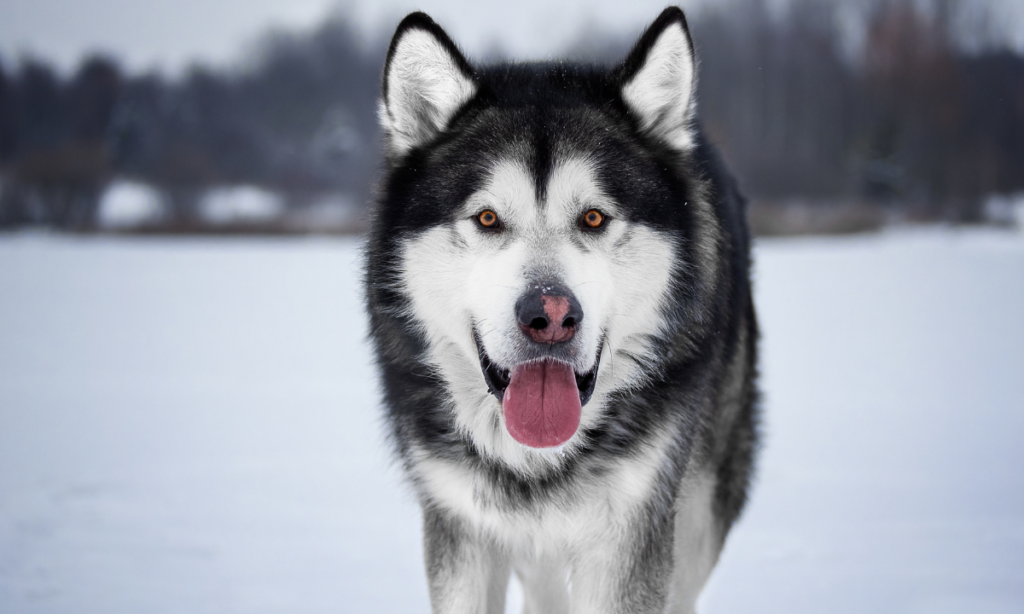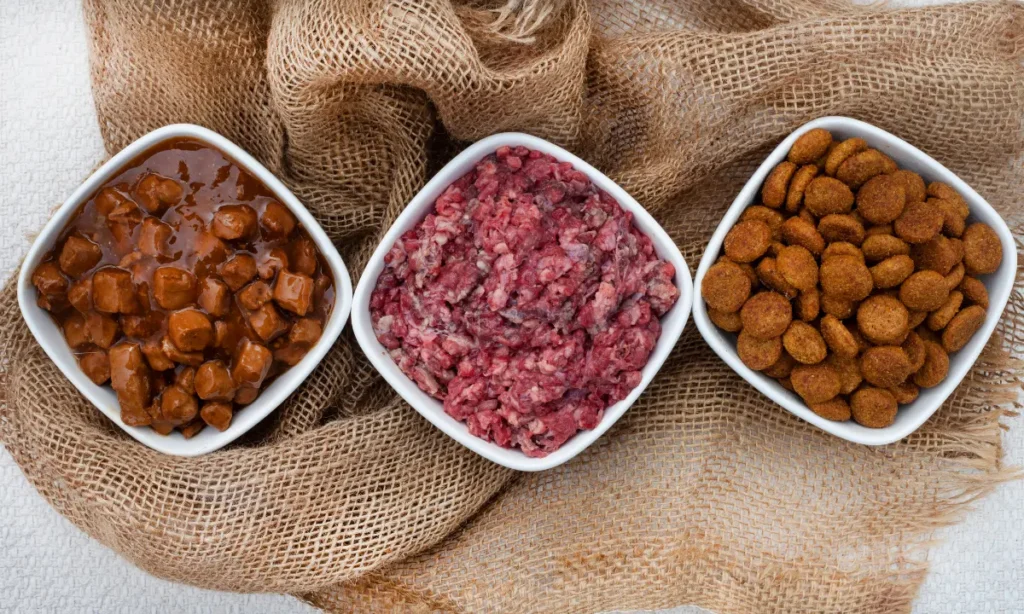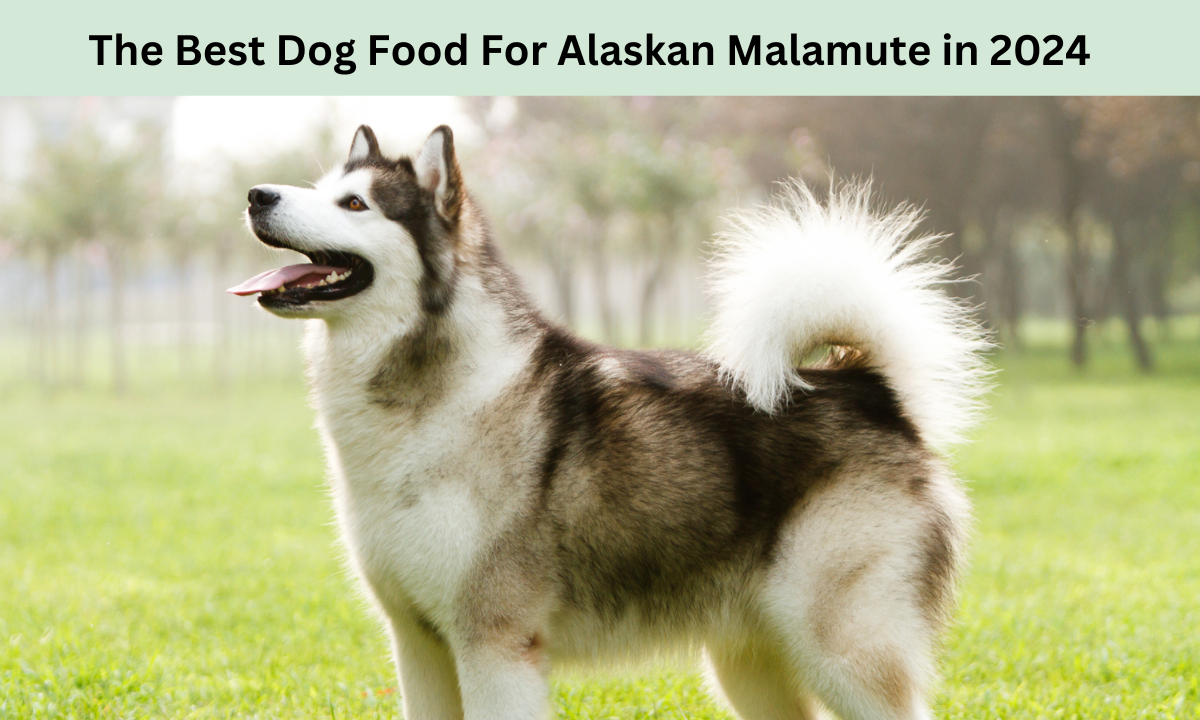The Alaskan Malamute is a large, hardy arctic dog. As their name suggests, Inuit people have historically used sled dogs in the snowy regions of Alaska and Northern Canada. They have thick coats that keep them warm in extreme cold. Malamutes are working animals with high energy and nutrient requirements. This article will look at the main nutritional requirements of Alaskan Malamutes in their diet and recommend the best dog foods for alaskan malamute.
Nutritional requirements of an Alaskan Malamute

Below, we have explained what nutritional requirements needed by Alaskan Malamute:
Protein
Protein is the most important nutrient for working dogs like the Alaskan Malamute. Protein provides the necessary building blocks for muscles, organs, and other tissues. The intense exercise of pulling a sled requires muscle. Adult Malamutes need a diet containing at least 22% protein from high-quality meat. Good protein sources for Malamutes are chicken, salmon, and beef. A lack of adequate protein can lead to muscle degeneration over time.
Fat
Fat is another important nutrient for a sled dog. It has a higher calorie density than protein or carbs, making it an effective source of consistent energy for intense workouts. Malamutes need at least 15% of their calories to come from fat. Sources such as fish, flaxseed, and chicken fat provide healthy fats. The fat also keeps their two coats cool and shiny. A diet that is too low in fat can lead to fatigue and dry skin.
Carbohydrates
Although carbs are not the primary energy source for working sled dogs, smaller complex carbs such as brown rice, oats, and barley provide glycogen for energy needs. Carbs should not contribute more than 25% of the total calories and protein levels needed for the root mass. No adjustment. Fiber from carbs also helps promote gut health. Too many carbs can negatively affect energy levels and weight management.
Natural Vitamins and Minerals
A balanced supply of vitamins and minerals is needed to keep all organs and systems functioning properly. Key vitamins and minerals for Malamutes include calcium and phosphorus for strong bones and teeth, vitamin A for eyes and coat, vitamin E as an antioxidant, and omega-3 fatty acids EPA and DHA for brain and heart health. A high-quality kibble ensures a full vitamin and mineral profile with no gaps.
Water
Water is crucial for hydration and acts as a carrier of nutrients. As working animals that often get cold, Malamutes need daily access to fresh, clean water. Signs of dehydration include dark stools, weakness, and increased thirst. It is important to note that there is more water in cooler temperatures.
The Best Dog Food Options For Alaskan Malamute

Below, we have mentioned some of the best dog food formulations for Alaskan Malamutes that are easy to digest and meet all their nutritional needs. It will also look at key considerations when choosing a meal. So read on to find out the best options for your furry friend:
High Protein Foods
Because Alaskan Malamutes are large, active working dogs, they need a high-protein diet. Protein provides energy and supports muscle growth. Good brands containing at least 25% protein include Origen, Akana, and Taste of the Wild. Real meat or fish is used as a staple that dogs digest quickly. Protein from meat also keeps them full longer. High protein intake increases their strength and supports their joints and muscles as they frequently experience joint issues.
Gluten-Free Options
Some Alaskan Malamutes are sensitive to gluten, commonly found in grains such as wheat and barley. Gluten-free dogs work well in such cases. Brands like Nutro, Blue Buffalo, and From Gold use potatoes, corn, or tapioca instead of rice to provide carbohydrates. This avoids digestive issues. A gluten-free diet also means fewer acne and skin problems. Even though wheat is the main ingredient, look for gluten-free options. This ensures that gluten-sensitive dogs remain healthy while receiving a good diet.
Grain Inclusive Foods
Some dogs are sensitive to grains, while others can tolerate and benefit from a diet that includes grains as a balanced diet. Popular brands like Royal Canin, Hills Science Diet, and Purina Pro Plan use moderate amounts of healthy grains like brown rice and oats. These provide complex carbohydrates for solid energy. They also provide fiber for easy digestion.
Weight Management Formulas
Like other large breeds, Alaskan Malamutes tend to overeat and become obese. Obesity can cause health issues. A specially designed diet is aimed at helping with weight management. Brands like Natural Balance, Blue Buffalo Weight Management, and Wellness Core offer reduced fat calories, leaving dogs leaner and healthier. These are high in protein and fiber, packing a few calories. Controlled portions contribute to metabolism and metabolism. Such foods are especially useful for the sedentary or older people.
Senior Dog Foods
As Alaskan Malumuts grow older, their needs change. Older dogs are less active with a slower metabolism. Some companies like Hills Science Diet, Royal Canin, and Purina Pro Plan have specific labels for dogs 7 years and older—these address age-related issues such as joint issues, kidney function, etc. Nutritional information and digestion have been adapted to suit the elderly with decreased energy levels. Look for a balanced supply of vitamins, minerals, and antioxidants that support the immune system in aging. Slow cooking with these foods also helps make them easier to chew and digest.
Recipe Variety
It helps fussy eaters to have a variety of foods. Most good brands offer ingredients other than chicken and grain, such as salmon, beef, lamb, and bison, and some of the best brands with foods suited to animal needs are Fromm, Origen, and Akana. Changing the flavor regularly stimulates their appetite and prevents them from eating boredom. Stories. A combination of protein sources and fruits and vegetables provides complete nutrition from various foods. Rotating food types involves the Malamutes and allows them to accept foods despite their strong tastes over time.
Best dog food for alaskan malamute with diarrhea
| Brand | Product Name | Main Ingredients | Special Features |
|---|---|---|---|
| Blue Buffalo | Wilderness Grain-Free | Deboned Chicken, Fish Meal, Chicken Meal | Limited Ingredient, Grain-Free Formula |
| Taste of the Wild | High Prairie Canine Formula | Bison, Venison, Lamb Meal | Probiotics, Prebiotics, Grain-Free |
| Wellness CORE | Grain-Free Original | Turkey, Chicken Meal, Salmon Meal | Digestive Health Support, Grain-Free |
| Hill’s Science Diet | Sensitive Stomach & Skin | Chicken, Brewers Rice, Chicken Meal | Easily Digestible, Promotes Healthy Skin |
| Purina Pro Plan | Sensitive Skin & Stomach | Salmon, Barley, Rice | Easily Digestible, Promotes Healthy Skin |
These dog foods are specifically formulated for dogs with sensitive stomachs and digestive issues, making them suitable options for Alaskan Malamutes experiencing diarrhea.
Homemade dog food for alaskan malamute
| Food | Benefits | Serving Portion |
|---|---|---|
| Lean Meat (e.g., Chicken, Turkey) | High-quality protein source, essential amino acids | 1/2 to 1 cup per meal |
| Brown Rice | Good source of carbohydrates, energy | 1/4 to 1/2 cup per meal |
| Sweet Potatoes | Rich in fiber, vitamins, and minerals | 1/4 to 1/2 cup per meal |
| Carrots | Excellent source of beta-carotene, promotes eye health | 1 to 2 tablespoons per meal |
| Green Beans | Low-calorie, high in fiber, supports digestive health | 1 to 2 tablespoons per meal |
| Pumpkin | Helps regulate digestion, rich in vitamins A and C | 1 to 2 tablespoons per meal |
| Blueberries | Antioxidant-rich, supports immune system | 1 to 2 tablespoons per meal |
| Coconut Oil | Supports healthy skin and coat, boosts energy | 1 teaspoon to 1 tablespoon per meal |
| Cottage Cheese | Good source of calcium and protein | 1 to 2 tablespoons per meal |
| Fish (e.g., Salmon) | Rich in omega-3 fatty acids, promotes joint health | 1 to 2 tablespoons per meal |
Note: Serving portions may vary based on your Alaskan Malamute’s size, age, and activity level. It’s essential to consult with your veterinarian to determine the appropriate serving sizes for your pet’s individual needs.
Conclusion
Good nutrition is essential to the health and happiness of the Alaskan Malamute. The dog’s age, activity level, allergies, and preferences are key factors when choosing from the many good choices among the brands mentioned here. A consistent diet will keep these furry companions strong yet healthy in body and mind. Timely advice from veterinarians and pharmacists can also guide you on the best options. With a little research and an open mind, any dog parent can find the right one to raise these cute puppies.
Frequently Asked Questions (FAQs)
Q.1: What is the best diet for an Alaskan Malamute?
Ans 1: For an Alaskan Malamute, a balanced diet that suits their energy requirements and life stage is ideal. This usually includes high-quality protein, good fats, vitamins, minerals, and fiber from fruits and vegetables.
Q.2: What foods are malamutes allergic to?
Ans 2: Some Alaskan Malamutes frequently have sensitive stomachs. Veterinarians advised that certain dogs can be intolerant to common food changes like carrots, peas, and even chicken.
Q.3: How often should you feed a Malamute?
Ans 3: The Texas Alaskan Malamute Rescue (TAMR) states that puppies should never be “free-fed” since they will wolf down every scrap of food in their dish until they are stuffed—and obese. Adult Alaskan Malamutes should be fed two meals daily, while puppies should be fed three meals daily.
Q.4: Can Malamute eat raw chicken?
Ans 4: Malamutes are capable of eating chicken. Malamutes require a lot of protein, which chicken is an excellent source of. It is also a good source of minerals, vitamins, and amino acids, among other nutrients. However, as raw chicken might harbor dangerous bacteria, you must feed cooked chicken to your Malamute.
Also Read:


